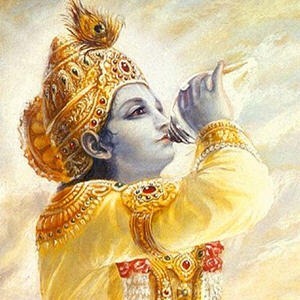101_Bhagavad Gita: Chapter 9, Verse 28 to 29
Description
Join the Whatsapp Group for daily messages and if you have any questions: https://chat.whatsapp.com/FU4pxFWwiBmDLW8lHNliZr
Join Secrets of Success on Telegram:
https://t.me/rasajnadas
Join LIVE session on SAVAJI ONLINE YouTube Channel every Sunday https://www.youtube.com/@savajionline
One who acts in Kṛṣṇa consciousness under superior direction is called yukta. The technical term is yukta-vairāgya. This is further explained by Rūpa Gosvāmī as follows:
anāsaktasya viṣayān
yathārham upayuñjataḥ
nirbandhaḥ kṛṣṇa-sambandhe
yuktaṁ vairāgyam ucyate
(Bhakti-rasāmṛta-sindhu, 1.2.255)
Rūpa Gosvāmī says that as long as we are in this material world we have to act; we cannot cease acting. Therefore if actions are performed and the fruits are given to Kṛṣṇa, then that is called yukta-vairāgya. Actually situated in renunciation, such activities clear the mirror of the mind, and as the actor gradually makes progress in spiritual realization he becomes completely surrendered to the Supreme Personality of Godhead. Therefore at the end he becomes liberated, and this liberation is also specified. By this liberation he does not become one with the brahma-jyotir, but rather enters into the planet of the Supreme Lord. It is clearly mentioned here: mām upaiṣyasi, “he comes to Me,” back home, back to Godhead. There are five different stages of liberation, and here it is specified that the devotee who has always lived his lifetime here under the direction of the Supreme Lord, as stated, has evolved to the point where he can, after quitting this body, go back to Godhead and engage directly in the association of the Supreme Lord.
Anyone who has no interest but to dedicate his life to the service of the Lord is actually a sannyāsī. Such a person always thinks of himself as an eternal servant, dependent on the supreme will of the Lord. As such, whatever he does, he does it for the benefit of the Lord. Whatever action he performs, he performs it as service to the Lord. He does not give serious attention to the fruitive activities or prescribed duties mentioned in the Vedas. For ordinary persons it is obligatory to execute the prescribed duties mentioned in the Vedas, but although a pure devotee who is completely engaged in the service of the Lord may sometimes appear to go against the prescribed Vedic duties, actually it is not so.
It is said, therefore, by Vaiṣṇava authorities that even the most intelligent person cannot understand the plans and activities of a pure devotee. The exact words are tāṅra vākya, kriyā, mudrā vijñeha nā bujhaya (Caitanya-caritāmṛta, Madhya 23.39). A person who is thus always engaged in the service of the Lord or is always thinking and planning how to serve the Lord is to be considered completely liberated at present, and in the future his going back home, back to Godhead, is guaranteed. He is above all materialistic criticism, just as Kṛṣṇa is above all criticism.
One may question here that if Kṛṣṇa is equal to everyone and no one is His special friend, then why does He take a special interest in the devotees who are always engaged in His transcendental service? But this is not discrimination; it is natural. Any man in this material world may be very charitably disposed, yet he has a special interest in his own children. The Lord claims that every living entity – in whatever form – is His son, and so He provides everyone with a generous supply of the necessities of life. He is just like a cloud which pours rain all over, regardless of whether it falls on rock or land or water. But for His devotees, He gives specific attention. Such devotees are mentioned here: they are always in Kṛṣṇa consciousness, and therefore they are always transcendentally situated in Kṛṣṇa. The very phrase “Kṛṣṇa consciousness” suggests that those who are in such consciousness are living transcendentalists, situated in Him. The Lord says here distinctly, mayi te: “They are in Me.” Naturally, as a result, the Lord is also in them. This is reciprocal. This also explains the words ye yathā māṁ prapadyante tāṁs tathaiva bhajāmy aham: “Whoever surrenders unto Me, proportionately I take care of him.” This transcendental reciprocation exists because both the Lord and the devotee are conscious. When a diamond is set in a golden ring, it looks very nice. The gold is glorified, and at the same time the diamond is glorified. The Lord and the living entity eternally glitter, and when a living entity becomes inclined to the service of the Supreme Lord he looks like gold. The Lord is a diamond, and so this combination is very nice. Living entities in a pure state are called devotees. The Supreme Lord becomes the devotee of His devotees. If a reciprocal relationship is not present between the devotee and the Lord, then there is no personalist philosophy. In the impersonal philosophy there is no reciprocation between the Supreme and the living entity, but in the personalist philosophy there is.
The example is often given that the Lord is like a desire tree, and whatever one wants from this desire tree, the Lord supplies. But here the explanation is more complete. The Lord is here stated to be partial to the devotees. This is the manifestation of the Lord’s special mercy to the devotees. The Lord’s reciprocation should not be considered to be under the law of karma. It belongs to the transcendental situation in which the Lord and His devotees function. Devotional service to the Lord is not an activity of this material world; it is part of the spiritual world, where eternity, bliss and knowledge predominate.





